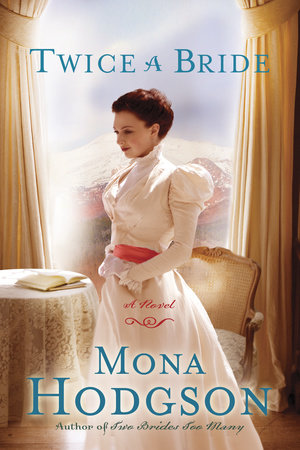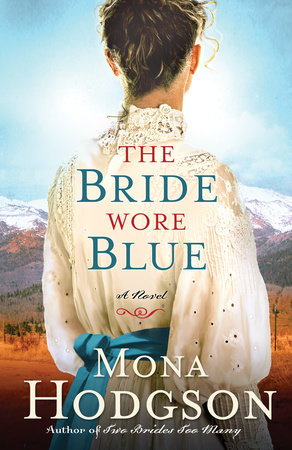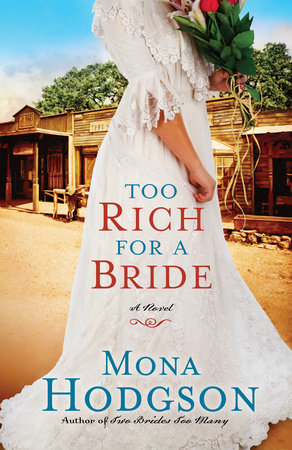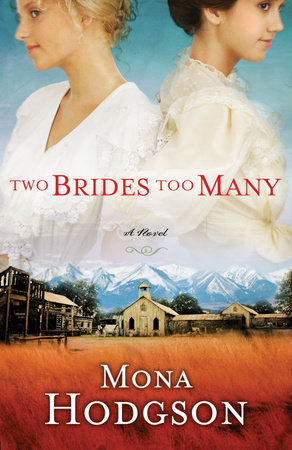Excerpt
Twice a Bride
1898
Jagged edges marked the sculpted granite at Willow’s feet. Love was like that. Smooth in places. Sharp and dangerous in others.
’Tis better to have loved and lost than never to have loved at all.
Willow stared at the white rose in her hand. She agreed with Alfred Lord Tennyson’s statement. But on this last day of August, churned clods of Colorado dirt formed a blanket over her father’s grave. Was it the loss of her father
so soon after their reunion, or was it fear threatening to rob her of air? Both were cunning adversaries.
She glanced at the shiny black carriage where her loved ones awaited her. Aunt Rosemary hadn’t looked at her today, but Willow had seen the apprehension clouding Mother’s eyes. Her brother, Tucker, had stared at her during the graveside service, worry rutting his brow. Even her sister-in-law watched her the way one would watch a pot on the brink of a boil.
If Willow dared to look in a mirror, she’d see the same question lurking in her own features. Could this insatiable sorrow pull her back into a tide she couldn’t withstand any more than Sam could survive the undercurrent in the
San Joaquin River?
She bent to the ground. “Father, I’m sorry for the anguish I’ve caused you. I wanted to be strong.” She laid the rose on the grave. “I won’t be a Weeping Willow this time.” Squaring her shoulders, she brushed away the tears spilling onto her cheeks. At what point after Sam’s death had her mourning become abnormal? Would she recognize warning signs if it were to happen again?
“Willow?” Tucker’s voice wafted on the breeze, just above a whisper.
Drawing in a fortifying breath, she looked at her brother and stood. His eyes narrowed as though he expected her to crumple. Tucker had been the only one to visit her at the asylum after Father had her committed, and he’d visited
her once a week despite never receiving notable response from her. Tucker met her gaze. “Are you all right?”
“Yes.” She brushed a blade of grass from her mourning gown. “I needed some time.”
“I can’t help but worry about you.”
She offered him a slight grin. “I know.”
He slid his hands into his trouser pockets. “You shouldn’t be alone.”
Willow agreed. She’d expected by this time in her life to be a pastor’s wife and herding at least two or three little Peterson tykes.
“I’m not alone.” Was she trying to convince him or herself ? “Mother and Aunt Rosemary are at the boardinghouse with me.”
He looked at the rose she’d placed on their father’s grave. “Saturday they’ll return to Colorado Springs.”
“But Miss Hattie is under the same roof, and she’s not going anywhere.”
Willow added a lilt to her voice to see if she could cause his brow to soften. “And I have you.”
Perhaps it was a mistake to live this close to her brother. He had a wife, a church to shepherd, and the Raines Ice Company to oversee. Worrying about her was not a pleasant way for Tucker to live. But if she didn’t settle in Cripple
Creek, where would she go? Nothing, and no one, awaited her in Stockton, California, where she’d grown up and married Sam.
Tucker’s shoulders sagged. “It’s not the same as having a spouse to… I’d feel better if you’d agree to move into the parsonage.”
Willow pressed the squared toe of her dull black shoe into the grass. “We’ve already talked about this, and my answer is the same.”
“You can’t blame a brother for trying.”
“I don’t.” She patted his bristled cheek. “I love you for it.”
Tucker offered his arm. “We best get to the house. A supper awaits us.”
A bereavement supper, to be exact, replete with long faces and selfconscious commiseration. She matched Tucker’s pace, determined to remain above the shared sadness.
At the wagon, Willow stepped onto the wrought-iron foot brace and seated herself beside her sister-in-law, Ida.
Concern laced Mother’s green eyes—the source of Willow’s own eye color. “Are you all right, dear?”
Willow nodded, her lips pressed against another swirl of grief. She wasn’t the only one burying a father or a husband today. “What about you, Mother? Are you all right?”
“As well as can be expected, I suppose.”
Tucker raised the reins. As the wagon jerked forward, Ida’s tender hand rested on Willow’s palm, and she squeezed her sister-in-law’s hand. Tears stung Willow’s eyes. She needed to find her own path, but she didn’t let go.
Uncharacteristically quiet, Tucker guided the horses down Second Street toward the rustic home their parents bought when they left Stockton. How ironic that when Father’s consumption got the best of him, nearly two years
ago, he ended up in a sanitorium. An institution, of sorts. Mother had moved in with her sister in Colorado Springs to be close to him. Tucker lived in the cabin until he and Ida married and moved into the parsonage. Now Otis and
Naomi Bernard and their four sons called the cabin home.
As they approached the creek-side property, Tucker slowed the horses. Mother let out a fragile moan, and Tucker reached over and patted her arm. Willow had seen the place once when she first came to Cripple Creek for
her brother’s wedding, but she’d never viewed it as her parents’ home. Home was the clapboard two-story house in Stockton where she and Tucker had grown up. The house where she’d planned her wedding.
She wanted to believe everything happened for a reason—that God had a divine plan. Last year she’d found it easy to believe He’d left her here on earth and healed her so she could help her parents through her father’s illness. But now? Father was gone. Mother planned to return to Colorado Springs with Aunt Rosemary. And her brother had a new life with a pregnant wife.
“Here we are,” Tucker said. A few horses and wagons formed a line between the cabin and the barn. Otis, the biggest man Willow had ever seen, stepped off the porch. His oldest son stood at his side. Even at ten years old, Abraham was already a miniature of his father—dark skinned and broad shouldered.
His wife, Naomi, awaited them at the open door. A paisley-print apron added a bright spot to her black broadcloth dress. “Please accept our condolences, Missus Raines.” The petite woman reached for Mother’s hands. “Mr. Raines was good to us. You both were, and I’ll never forget that.” Sincerity shone in her dark eyes.
“Thank you.” Mother glanced at Abraham. “We appreciate all you and your father did to keep the ice deliveries going when Mr. Will took sick.”
Nodding, Abraham twisted a floppy hat in his hands. “Ma’am, Mr. Will did have a big bark, but he never bit me.”
Tucker was the first to laugh, but Willow and Mother soon joined him.
Naomi didn’t laugh. She glared first at Otis, then at her son. “Abraham, you will apologize for your disrespect.”
Abraham’s brow crinkled. The boy obviously didn’t realize that what he’d said was, by some standards, inappropriate. He straightened nonetheless, his arms tucked into his sides in a contrite manner. “I apologize, Missus Raines. I didn’t mean any disrespect. I liked Mr. Will. He always gave me a penny for candy or gave me a Tootsie Roll—my favorite.”
Mother smiled. “He liked you too, Abraham.” She patted the child’s head, then looked at his mother. “Naomi, your son is right. My husband did sound off with quite a bark now and then.”
Willow remembered her father’s bark, and she already missed it.
Naomi opened her mouth to speak, but Mother beat her to it. “No harm done.”
“Thank you.” Naomi stepped away from the open door. “Lots of folks have come to pay their respects.”
They entered the cabin one after the other, Willow stepping into the front room last. Before she reached the food tables, a stout woman stepped in front of her.
“I’m Mrs. Henry.”
“Your husband drives one of the ice wagons.”
“Yes.” Mrs. Henry narrowed her hazel eyes, looking at Willow but not meeting her gaze. “According to everything I’ve read in Scripture, if your father is in heaven, he’s in a far better place.”
If? Willow coughed as if she’d just swallowed something sour. She covered her mouth, more in an attempt to stifle her retort than as an act of propriety. Mrs. Henry had good intentions, didn’t she? Offering the woman the benefit of her doubt, Willow nodded, then glanced across the crowded room. Hattie Adams stood with Ida at the dessert table, and Willow suddenly had a hankering for something sweet—their company.
Her sister-in-law brushed a tear from her cheek. Tucker had found a good wife. Ida had a big heart and was mourning the loss of a man she barely knew. Hattie pulled a handkerchief from her apron pocket.
Willow regarded the stout woman still planted in front of her. “If you’ll excuse me.”
“Of course.” Mrs. Henry tugged the white collar on her black shirtwaist.
“Just remember, it’s always darkest before the morning.”







